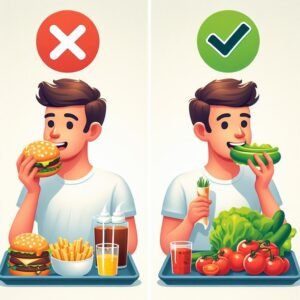All About Calories
Did you ever notice that a person eats a little but remains fat, on the other hand, a person eats a lot but remains slim. Have you ever wondered why? Because it doesn’t matter how much you eat; it depends on how many calories you consume.
What is a calorie?
A calorie is a measure of energy. Our body requires calories to carry out its functions, including breathing, blood circulation, and physical activity. Calories represent the energy obtained from consumed food and beverages, as well as the energy expended during physical activity.
Why are calories important?
For many years of research, it has been proven that calories are the main factor in our stamina and in losing or gaining body weight.
How to measure calories?
You can measure your daily calorie needs by calculating your Basal Metabolic Rate (BMR), which is the number of calories your body needs at rest.
Here is the equation of BMR
Men BMR=88.362+(13.397×weight in kg)+(4.799×height in cm)−(5.677×age in years)
Women BMR=447.593+(9.247×weight in kg)+(3.098×height in cm)−(4.330×age in years)
Now, let’s determine your daily calorie needs based on your activity level:
- Less active (little or no exercise): Multiply your BMR by 1.2.
- Lightly active (1-3 days of light exercise per week): Multiply your BMR by 1.375.
- Moderately active (3-5 days of moderate exercise per week): Multiply your BMR by 1.55.
- Highly active (6-7 days of heavy exercise per week): Multiply your BMR by 1.725.
- Very highly active (intense exercise daily or physical job): Multiply your BMR by 1.9.
Suppose I am 25 year old man and my weight is 75kg , height 176cm. Then my –
BMR= 88.362+(13.397×75)+(4.799×176)−(5.677×25)
= 1795.84
For calculate my daily calorie needs , multiply the BMR according to my daily activity. Suppose I am moderately active (3-5 days of moderate exercise per week). Then my –
Daily calorie needs = 1795.84 x 1.55
= 27383.55 cal
Weight loss by calorie deficits:
Once upon a time, I was 92.4 kg in weight. I want to be fit, that’s why I started researching and losing my weight by calorie deficit method. A calorie deficit occurs when you consume fewer calories than your body burns. It’s the foundation for weight loss. First you need to measure your daily calorie need by BMR method. Then here’s how it works:
- Our Body requires energy (measured in calories) to function daily activities.
- If we eat fewer calories than our body needs, we’re in a calorie deficit.
- In a deficit, our body taps into body fat to meet its needs, resulting in weight loss.
Creating a Calorie Deficit:
We can achieve a calorie deficit by:
- Eat fewer calories than your body requires means less calorie intake.
- Burn more calories through exercise.
- Combining both approaches. Adjust your diet and activity levels
Practical Tips and Warnings for Weight Loss:
- Set a Calorie Target: Aim for a consistent daily deficit (e.g., 500 calories) for gradual fat loss. More than 500 calorie deficits may cause many health problems.
- Track Calorie Intake: Use apps or journals to monitor calories.
- Prioritize Nutrient-Dense Foods: Opt for whole grains, lean proteins, fruits, and vegetables.
- Control portion size.
- Stay Hydrated: Proper hydration supports metabolism.
- Avoid unhealthy-Calorie Foods: Limit sugary snacks and processed foods.
- Incorporate Resistance Training: Build muscle to boost metabolism.
Remember, safety and sustainability are key. Consult a healthcare professional or registered dietitian for personalized guidance.
Gain weight by calorie intake:
If you’re looking to gain weight, you have to intake more calories than your daily calorie needs. Here are some practical strategies to help you achieve your goal:
Calculate Your Calorie Needs:
Use a weight gain calculator to estimate how many calories you need to eat to increase your weight. You can choose your desired pace of weight gain (normal or stricter) and set a target weight.
Generally, aim to add 250-500 calories to your daily intake for slow and steady weight gain, or 700-1,000 calories per day for faster results.

Choose Nutrient-Dense Foods:
- Focus on healthy, calorie-dense foods to avoid unhealthy belly fat.
- Include protein, carbohydrates, and healthy fats in your diet.
- Examples: Nuts, dried fruit, lean meats, whole grains, avocados, and dairy products.
Strength Training and Exercise:
- Combine weight gain with muscle-building.
- Engage in resistance training to build muscle mass.
- Exercise helps increase appetite and promotes overall health.
Stay Hydrated and Rest Well:
Proper hydration supports metabolism.
Get enough quality sleep to aid recovery and muscle growth.
Remember that gaining weight healthily involves a balanced approach. Consult a healthcare professional or registered dietitian for personalized guidance.




